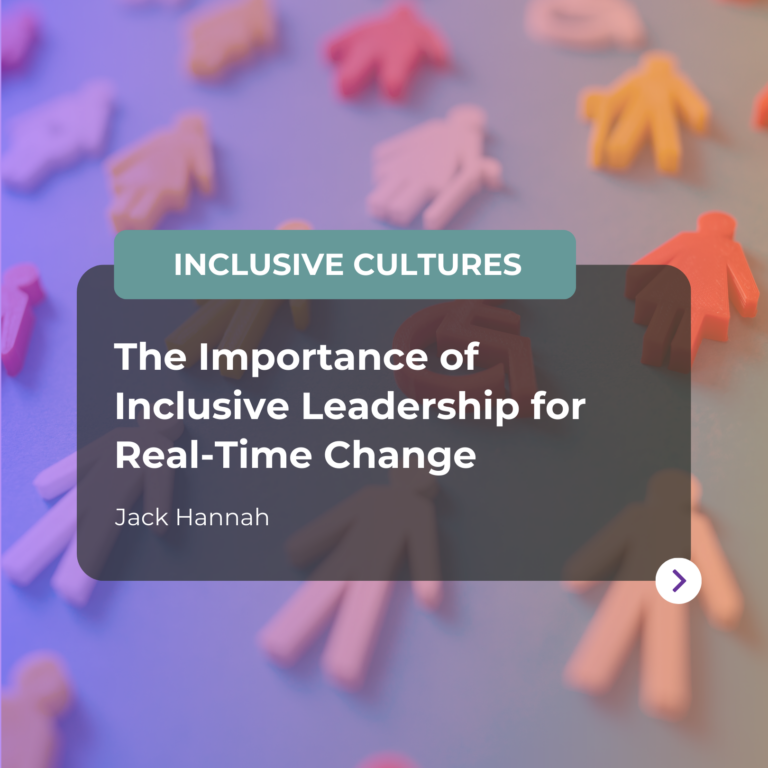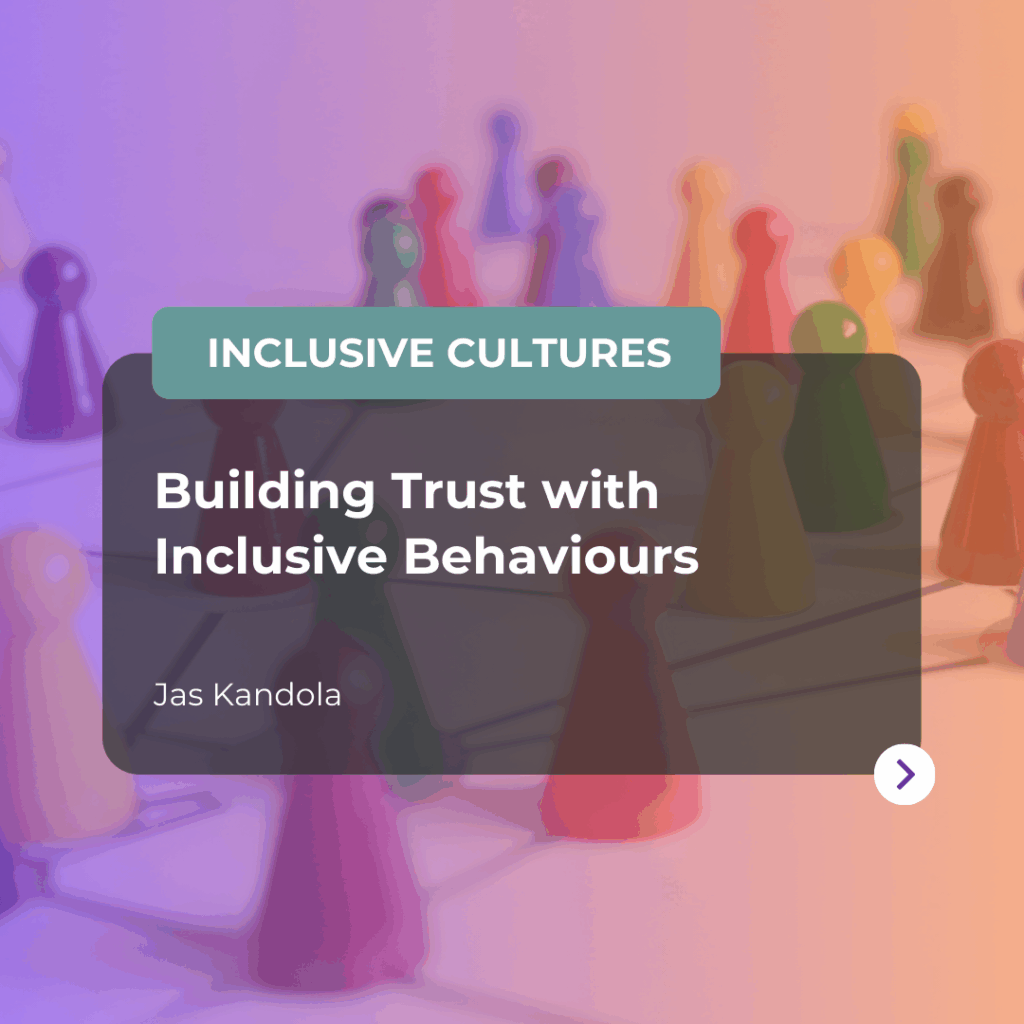In this article, placement student Jack Hannah distils a recent webinar from Managing Psychologist Janet Tarasofsky, focusing on why real-time leadership matters.
Inclusive leadership in real-time is essential for organisations aiming to stay competitive and responsive. This approach involves leaders actively adapting their behaviours and strategies to foster inclusive environments that resonate with diverse teams.
This article will cover:
- Why inclusive leadership matters
- 3 key steps for developing effective leadership.
- Overcoming common barriers to behaviour change
- Practical actions leaders can take to embed inclusivity.
Why Inclusive Leadership Matters
The concept of real-time leadership goes beyond traditional leadership. It emphasises the ‘agile leader,’ which enables the implementation of behavioural change faster and more effectively. Leaders who succeed make impactful decisions rooted in inclusivity and responsiveness to changing environments. As Janet highlighted, Pearn Kandola’s research indicates that while many leaders believe they are inclusive, self-serving biases often lead them to assume others need to change, overlooking their own areas for improvement.
By developing real-time leadership skills, organisations can benefit from more engaged teams, greater innovation, and an inclusive culture that attracts and retains top talent. Furthermore, research has shown that companies fostering inclusivity perform better and enjoy increased employee satisfaction and productivity.
3 Key Steps for Developing Effective Leadership
Pearn Kandola’s framework for inclusive leadership focuses on three main steps that define real-time, effective leadership:
- Self-awareness: During the webinar, it was noted that self-assessment and team feedback on inclusivity can reveal gaps in leaders’ perceived and actual behaviours. Furthermore, research shows that 85% of us believe ourselves to be less biased than others, that we are not the problem, and instead others are. This is known as a self-serving bias and developing self-awareness is fundamental to understanding ourselves and recognising the role we have to play in leveraging more inclusive change.
- Individualisation: Once self-awareness is recognised, leaders must understand and acknowledge individual differences within their teams. Every member of the team has different individual needs and consequently, an agile leader should support them while enabling authentic self-expression. This strengthens trust and respect, fostering a safe environment where team members feel listened to and heard.
- Implementation: To implement bespoke and specific situations, PK utilises psychologically tested scenarios to ensure maximum impact. This is backed up by psychological research regarding experiential learning theory, which emphasises memory and hands-on experience has a more lasting impact as opposed to simply a presentation and reading facts and figures. This implementation also allows the training to be tailored to the specific organisation, crafting a layout reflecting what would occur day-to-day as opposed to a simply standardised presentation.
Practical Actions Leaders Can Take to Implement Inclusivity
Real-time leadership and behaviour change require actionable steps. Here are five practical ways leaders can cultivate inclusivity:
- Self-evaluation and team feedback: Leaders should constantly assess their own and the team’s inclusivity and encourage team feedback to understand any discrepancies. This reveals areas for improvement, promoting transparency and trust.
- Flexible adjustments for equity: Accommodating employees’ individual needs is a crucial step to ensure employees’ productivity is at its best. For example, an employee with religious requirements may need flexible hours for prayer breaks and to avoid work-related activities on specific days. By acknowledging and providing these, a supported, balanced and productive work environment can begin to emerge.
- Immersive, evidence-based training: Pearn Kandola emphasises that immersive learning experiences are vital to behaviour change, however, development must be based on evidence, not imagination. Experiences create long-lasting impressions therefore the training utilises experiential learning theory, allowing leaders to experience bespoke personalised simulations and real-life scenarios, creating lasting memories through learning that’s specific to them. As psychologists, we are well placed to equip leaders with tools they can immediately apply, driving change directly after training.
Overcoming Common Barriers to Behaviour Change
Even with these steps in place, resistance to change is common. Janet addressed this during the Q&A, noting that resistance often stems from a lack of awareness about the tangible benefits of inclusion, both financially and in terms of employee well-being. Additionally, some leaders may feel that if current practices are “working,” there is no need to change. However, data indicates that inclusive companies perform better, and change is essential for long-term success.
One of the key misconceptions that Janet addressed was the notion of “special privileges.” Leaders may worry that providing individuals accommodations will necessitate similar adjustments for everyone, but Pearn Kandola emphasises the difference between equality and equity. Equity means recognizing individual needs and providing resources to ensure each employee can contribute effectively. This approach does not undermine fairness but strengthens it.
The Future of Real-Time, Inclusive Leadership
Real-time leadership is an evolving discipline that requires continuous commitment and adaptation. Pearn Kandola’s inclusive leadership programs, with over 30,000 leaders trained, demonstrate the effectiveness of psychological-backed approaches in fostering inclusivity.
Inclusive leadership is essential to fostering innovation, collaboration, and a sense of belonging across teams. As organisations continue to evolve, leaders who embrace real-time, adaptive strategies will be best equipped to create cultures where every team member can thrive.
If your organisation is ready to elevate its approach to inclusivity and support leaders in adopting real-time strategies, reach out to Pearn Kandola at info@pearnkandola.com to learn more about our inclusive leadership solutions.






